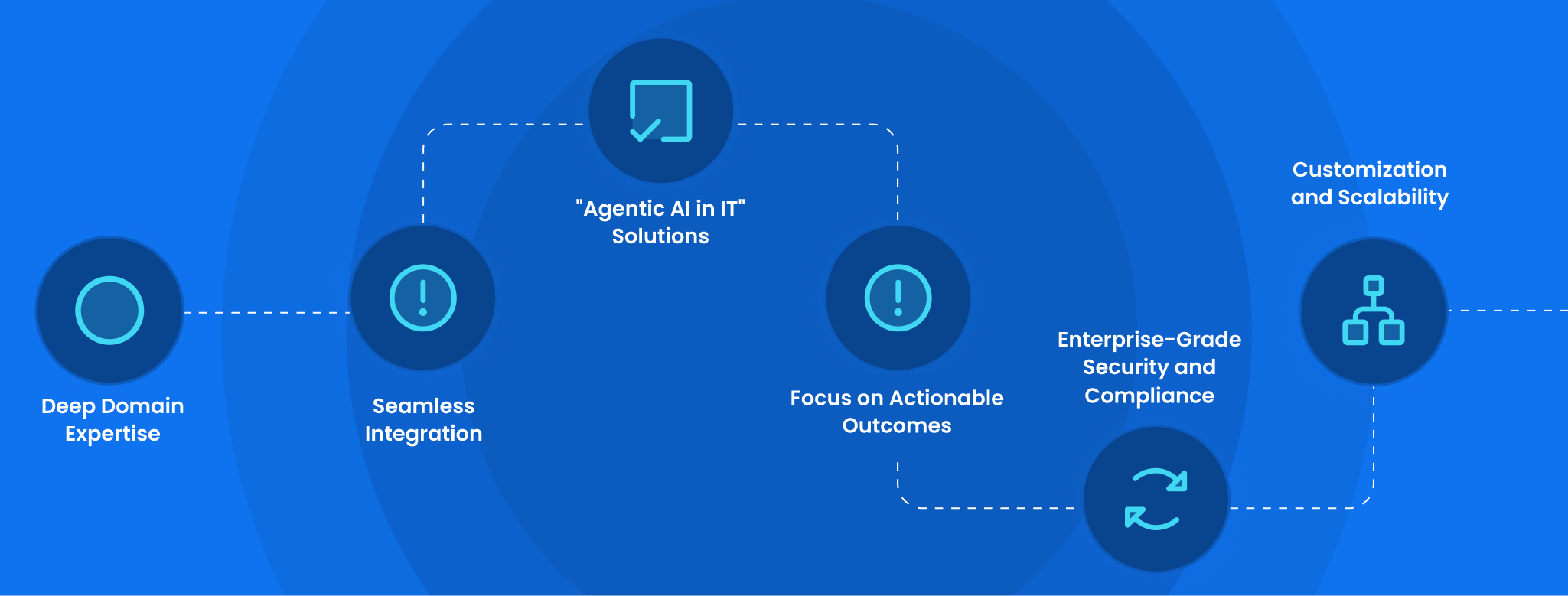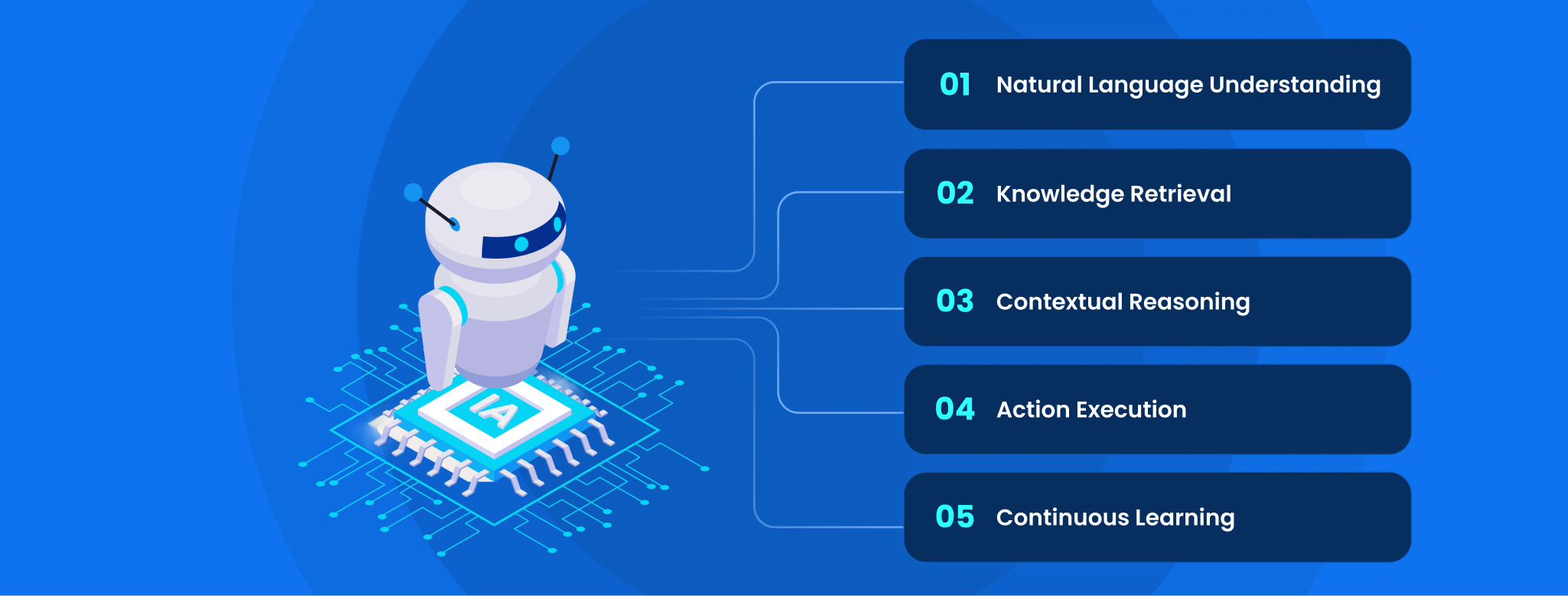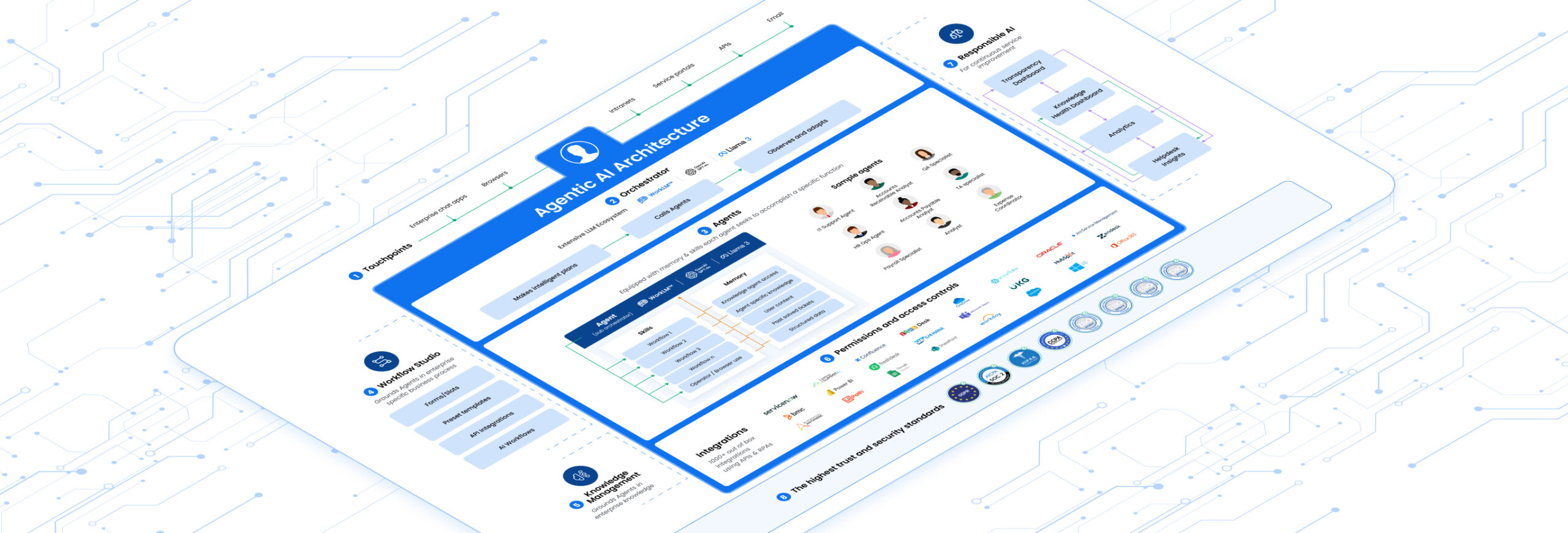Introduction
In the fast-paced world of large US companies, keeping your workforce productive and engaged is paramount. As a Chief Information Officer, Chief Technology Officer, or Technology Head, you’re constantly seeking innovative solutions to streamline operations, enhance employee experience, and maintain a competitive edge. This is where understanding what is an AI assistant becomes critical, especially as we look at the trends shaping 2025. It’s no longer about simple chatbots; it’s about intelligent partners that transform how your employees interact with critical support functions.
What is an AI Assistant?
At its core, an AI assistant is a sophisticated software program designed to understand natural language, engage in conversations, and perform tasks. Unlike basic chatbots that follow rigid scripts, a modern AI assistant leverages artificial intelligence, including advanced machine learning and natural language processing, to learn, adapt, and handle complex requests. Think of it as your company’s most efficient, ever-learning employee, dedicated to instantly resolving issues and answering questions across various departments. It’s a digital colleague that provides immediate, personalized support, freeing up your human teams to focus on strategic initiatives.
How AI Assistants Work
The magic behind an AI assistant lies in its advanced technological framework. When an employee asks a question or reports an issue, several intricate processes kick in:
-
Natural Language Understanding: The AI assistant first processes the input, understanding the intent and context of the query, regardless of how it’s phrased. This is like understanding nuances in human conversation.
-
Knowledge Retrieval: It then sifts through vast amounts of information , your company’s knowledge base, past tickets, internal documents, and HR policies , to find the most accurate and relevant answer.
-
Contextual Reasoning: A sophisticated AI assistant maintains context throughout a conversation, allowing for follow-up questions and more natural interactions. It remembers previous turns, just like a human conversation.
-
Action Execution: Beyond just providing answers, many AI assistants can perform actions. This might involve initiating a password reset, updating a payroll detail, or ordering new equipment. This capability moves the AI from a mere responder to an active problem-solver.
-
Continuous Learning: Every interaction helps the AI assistant learn and improve. Through machine learning, it identifies patterns, refines its responses, and becomes more efficient over time, offering a continuously improving experience for your employees.
Key Benefits of AI Assistants for Enterprises
Adopting an advanced AI assistant brings a wealth of advantages for large organizations, directly impacting your bottom line and operational efficiency in 2025.
- Elevated Employee Experience: Imagine instant resolutions for common IT, HR, or Finance queries, available 24/7. This dramatically reduces frustration and empowers employees to find solutions quickly, fostering a more productive and positive work environment.
- Significant Cost Savings and Enhanced ROI: By automating routine requests, AI assistants drastically reduce the volume of tickets your human support teams handle. This leads to lower operational costs, as well as enabling your highly skilled staff to focus on complex, high-value tasks that truly move the needle for the business. This directly translates to a strong return on investment.
- Boosted Productivity and Efficiency: When employees get quick answers to their questions, they spend less time searching for information and more time on their core responsibilities. Furthermore, your IT, HR, and Finance teams become more efficient, as their workload shifts from repetitive tasks to more strategic problem-solving.
- Seamless Integration with Existing Systems: A modern AI assistant is designed to integrate effortlessly with your current enterprise software, including your ticketing systems, Human Resources Information Systems, and Enterprise Resource Planning platforms. This ensures a unified experience and avoids creating new data silos.
- Scalability for Growth: As your company expands, an AI assistant scales effortlessly to meet increased demand without the need for proportional increases in human staff. This provides a flexible and sustainable support model for future growth.
- Data-Driven Insights: AI assistants collect valuable data on employee queries and resolutions, providing you with actionable insights into common pain points and areas for improvement across your organization. This empowers you to make informed decisions about internal processes.
Common Use Cases of AI Assistants
The applications of an AI assistant extend far beyond simple help desk interactions, touching various facets of your enterprise operations.
- IT Support Transformation:
- Automated Troubleshooting: Resolving common issues like password resets, connectivity problems, or software installation guidance without human intervention.
- Ticket Management: Automatically classifying, prioritizing, and routing complex tickets to the correct human agent, speeding up resolution times.
- Software Provisioning: Handling requests for new software or access to applications, directly interacting with provisioning systems.
- HR Support Reinvention:
- Policy Clarification: Answering questions about company policies, benefits, vacation time, and expense reporting.
- Onboarding Assistance: Guiding new hires through the onboarding process, answering frequently asked questions about their first weeks.
- Payroll and Benefits Queries: Providing instant information on pay stubs, health insurance details, or retirement plans.
- Finance Operations Optimization:
- Expense Management: Helping employees submit expense reports, clarify policy, and check approval statuses.
- Invoice Queries: Answering questions about vendor invoices, payment schedules, or budgeting guidelines.
- Procurement Support: Assisting with ordering supplies, checking order statuses, and navigating procurement processes.
Challenges in Implementing AI Assistants
While the benefits are clear, implementing an AI assistant effectively requires careful planning and consideration.
- Data Quality and Availability: The effectiveness of an AI assistant is directly tied to the quality and accessibility of your enterprise data. Incomplete or siloed data can hinder its ability to provide accurate responses.
- Integration Complexity: Integrating with a diverse range of legacy systems and modern applications can be complex. Ensuring seamless data flow and process automation requires robust integration capabilities.
- Maintaining Human Touch: For complex or sensitive issues, human interaction remains crucial. The challenge is in designing a system that knows when to seamlessly hand off to a human agent, providing a blended support model.
- User Adoption: Employees need to trust and embrace the new technology. Clear communication, training, and a positive initial experience are vital for successful adoption.
- Ongoing Maintenance and Training: An AI assistant isn’t a “set it and forget it” solution. It requires continuous monitoring, training with new data, and adjustments to improve performance and keep pace with evolving business needs.
How Leena AI Builds Intelligent AI Assistants
At Leena AI, we specialize in building advanced AI assistants that transcend traditional chatbot capabilities, offering a true “Agentic AI” experience. Our approach focuses on delivering value for large US enterprises by addressing the complexities you face.
- Deep Domain Expertise: We don’t just provide generic AI; our assistants are trained on vast datasets specific to IT, HR, and Finance operations, ensuring highly accurate and relevant responses for your employees.
- Seamless Integration: Our platform is designed for deep, out-of-the-box integration with your existing enterprise applications, including ServiceNow, Workday, SAP, Oracle, and more, creating a unified employee experience.
- “Agentic AI in IT” Solutions: Leena AI is pioneering Agentic AI for IT support. Instead of merely answering questions, our AI agents can proactively identify and resolve issues, execute complex workflows across systems, and even learn from new situations to prevent future problems. For example, our Agentic AI can detect a widespread software glitch, automatically raise a critical ticket, troubleshoot potential causes by querying diagnostic systems, and then inform affected employees, all without human intervention.
- Focus on Actionable Outcomes: Our AI assistants are built not just to inform but to act. Whether it’s auto-resolving a password lockout, processing a leave request, or updating a ticket status, our goal is to drive immediate, tangible resolutions for your employees.
- Enterprise-Grade Security and Compliance: We prioritize the security and privacy of your data, adhering to strict industry standards and providing robust controls to ensure your sensitive information remains protected. Our solutions are built with compliance in mind, giving you peace of mind.
- Customization and Scalability: We understand that every enterprise is unique. Our AI assistants are highly customizable to fit your specific workflows and policies, and they are engineered to scale seamlessly with your organization’s growth and evolving needs.

The Future of AI Assistants
Looking ahead to 2025 and beyond, the evolution of the AI assistant promises even more transformative capabilities for enterprises. We anticipate:
- Hyper-Personalization: AI assistants will offer increasingly personalized experiences, leveraging deeper insights into individual employee roles, preferences, and past interactions to provide truly tailored support.
- Proactive and Predictive Support: Moving beyond reactive problem-solving, AI will anticipate potential issues before they arise. Imagine an AI assistant detecting a network anomaly and proactively resolving it or notifying affected users before they even experience an outage.
- Autonomous Agent Expansion: AI agents will gain more autonomy, capable of managing increasingly complex, multi-step tasks across various systems without human oversight, fundamentally changing how internal operations are executed.
- Enhanced Emotional Intelligence: Future AI assistants will better understand the sentiment and emotional tone of employee queries, allowing for more empathetic and nuanced interactions.
- Augmented Human-AI Collaboration: The focus will shift from replacement to augmentation, with AI assistants working seamlessly alongside human teams, providing them with advanced tools and insights to handle the most intricate challenges.
The journey of understanding what is an AI assistant leads us to a future where support is instant, personalized, and profoundly impactful for your organization. At Leena AI, we’re committed to helping you navigate this future, empowering your employees and elevating your enterprise operations with intelligent, agentic AI.
Frequently Asked Questions
What is an AI assistant, and how does it differ from a chatbot?
An AI assistant is an advanced program using artificial intelligence to understand natural language, learn, and perform complex tasks, often across multiple systems. A chatbot, while conversational, typically follows more rigid, pre-programmed scripts and has limited understanding and action capabilities.
How can an AI assistant improve employee productivity in my company?
An AI assistant improves productivity by providing instant, 24/7 resolutions to common IT, HR, and Finance questions and issues. This reduces time employees spend waiting for support and frees up human teams for more strategic work.
What kind of return on investment can I expect from implementing an AI assistant?
You can expect significant ROI through reduced operational costs, increased efficiency from automated tasks, higher employee satisfaction, and improved retention due to a better internal support experience.
Is an AI assistant secure enough for sensitive company data?
Yes, reputable AI assistant providers prioritize enterprise-grade security, including data encryption, strict access controls, and compliance with major regulatory standards to protect your sensitive company information.
How difficult is it to integrate an AI assistant with our existing systems?
Modern AI assistants are designed for seamless integration with a wide range of enterprise systems like ITSM platforms, HRIS, and ERPs, leveraging APIs to connect without disrupting your current infrastructure.
Agentic AI means the assistant can not only answer questions but also proactively identify problems, execute multi-step solutions across different systems, and learn from its actions to prevent future issues, moving beyond simple responses to actual problem-solving.














